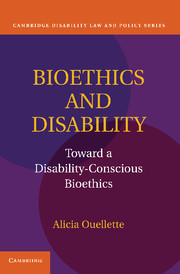8 - Toward a Disability-Conscious Bioethics
Published online by Cambridge University Press: 07 June 2011
Summary
Throughout this book, i have argued that bioethicists have good reason to work with members of the disability community to resolve ongoing conflicts. The thrust of my argument is that reconciliation is necessary to the work of bioethics insofar as bioethics is concerned with facilitating good medical decision making. Good medical decision making depends on at least three things: trust, knowledge, and communication. As a field, bioethics has emerged as a key player in formulation of policy, resolution of disputes, and creation of educational initiatives that develop trusting relationships, encourage the reliance on objectively verifiable data, and foster clear and open communication between by all parties to medical decision making. Its effectiveness in these roles is undermined at every level (in individual ethics consultations, in policy making, in educational initiatives) by indifference to or ignorance about the contribution of disability scholars to the body of knowledge relevant to good patient care, as well as the perception by some members of the disability community that bioethics as a field works against the interests of people with disabilities. Reconciling the conflict will remove a barrier to this work. True reconciliation will, of course, require engagement of all parties to the conflict. It cannot be forced on any individual. But bioethicists can jump-start the process by developing a deep understanding of the concerns and values of members of the disability community, acknowledging the extent to which bioethics has been insensitive or indifferent to those concerns and the experience of disability, and working to become deliberately conscious of disability-related issues in their work.
- Type
- Chapter
- Information
- Bioethics and DisabilityToward a Disability-Conscious Bioethics, pp. 315 - 366Publisher: Cambridge University PressPrint publication year: 2011

